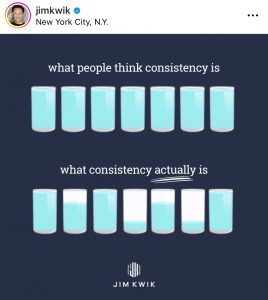Read this before starting a new habit (again). For the past 11+ years working 1-1 with clients, I’ve helped people build and stick to the habits they want. Since many of us like to learn from others instead of hitting our own brick walls, I’m sharing the top reasons why new habits most often fall apart.
Take these learnings and apply to your own life as it feels right. And if you’ve found yourself in this cycle of trying to create a new habit that always seem to fall apart after x amount of days, take a moment to be kind to yourself… and imagine Maya Angelou’s mothering voice saying:
“I did then what I knew how to do. Now that I know better, I do better.”
Reason #1 Lack of commitment:
Often people have goals for themselves and begin starting a new habit to help them achieve that goal. But they do not fully commit to the process. They may have a vague idea of what they want to achieve but fail to create a specific plan or timeline. Without a clear plan and commitment, it’s easy to get sidetracked or lose motivation, making it difficult to sustain the new habit. You have to have a plan.
Reason #2: Overwhelming changes
Sometimes people try to make too many changes at once, which can lead to feeling overwhelmed and eventually giving up on the new habit altogether. Starting small and gradually building up is a more effective approach to forming a new habit. This allows the brain to adjust to the new behavior and make it a more permanent part of daily life. You’re literally in the process of rewiring your brain. Start small, consistently crush that habit and associate positive feelings and success first before you add more. If you want to cut sugar out of your diet, you might not go cold turkey. Maybe you start with removing sugar from your home and saving desserts for special occasions. Maybe you switch from cane sugar to maple syrup and slowly add smaller amounts.
Reason #3: Lack of accountability
There are some things we do well at on our own. And some where we are better together. Know thyself. If you know you’ve been unsuccessful at doing something on your own in the past, try something different this time and get accountability. Without some form of accountability, it’s easy to slip back into old habits. When people are not accountable to anyone, they’re less likely to feel the need to keep up with their new habit or feel the consequences of not doing so. Can you relate? Having a support system or accountability partner greatly increases our chances of staying on track and motivated. This is one of the top reasons people come to me 1-1 is for accountability even if they know what to do. And my guided sugar cleanses offer the same in a group format. It bears repearting, we’re better together.
Reason #4: Failure to identify triggers and obstacles
Even if we commit, set realistic habits, and have accountability, life still happens. As part of our plan, we should anticipate that every new habit has its own set of challenges. Obstacles will come. Expect them. Identify what might trigger you to revert to old habits and what obstacles you might encounter along the way. Without this awareness, we aren’t as prepared to handle setbacks or may not know how to overcome them. By identifying potential challenges and triggers, we can create a plan to overcome them and stay on track. If you eat well at home, but when you travel, it all falls apart, that’s a good thing to know. How you can make a plan for eating healthy when you travel? Hint: it won’t be the same thing that works at home. And listen, even if it gets you 40, 50, or 60% the way there, that’s AWESOME. Having a plan that anticipates these obstacles keeps us from either having no plan at all and accomplishing 0% of our goals or from being rigid and consistently disappointed in ourselves. It helps us have more freedom.
Reason #5: Lack of consistency
Ok, this one is my favorite and one I talk about consistently (!) with all my classes and clients. Consistency doesn’t mean we’re 100% all day every day. It means, we keep at it. As James Clear says —
“Sometimes all you need for exceptional results is average effort repeated for an above-average amount of time.”
Some days are better than others, but we keep going. Habits require consistency to be formed. When we’re inconsistent with our new habit, we may not see progress or changes, leading to frustration and a lack of motivation. We need consistency for our beautiful, neuroplastic brains to form the neural pathways necessary to make the behavior automatic. It’s important to make the new habit a priority and consistently practice it until it becomes a natural part of daily life.
Check out my last post: 3 Tips for Starting (and Keeping) Any New Habit

